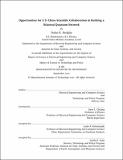Opportunities for U.S.-China scientific collaboration in building a bilateral quantum network
Author(s)
Hedglin, Nolan R.
Download1227278158-MIT.pdf (6.151Mb)
Alternative title
Opportunities for US-China scientific collaboration in building a bilateral quantum network
Opportunities for United States -China scientific collaboration in building a bilateral quantum network
Other Contributors
Massachusetts Institute of Technology. Department of Electrical Engineering and Computer Science.
Massachusetts Institute of Technology. Institute for Data, Systems, and Society.
Technology and Policy Program.
Advisor
Isaac L. Chuang.
Terms of use
Metadata
Show full item recordAbstract
From advancements in time transfer to networked science, quantum networks can enable a new host of experiments that would not otherwise be achievable. We can learn a lot about building such a network to connect quantum resources globally through international cooperation. Toward this end, we argue that the countries best equipped to forge the path for building a global quantum network are the two largest countries spearheading research in the field: the U.S. and China. An analysis of each country's innovation landscape tells us that their primary interest in quantum technology is motivated by the desire to modernize their military. Both countries may be apprehensive to collaborate because the perceived security risks of a knowledge exchange far outweigh the benefits they would receive in accelerating innovation. Any proposal for a joint project is mired in the urgent geopolitical crisis that is U.S.-China relations. As escalatory retaliation, the U.S. has adopted a policy of innovation isolationism since ²0¹9 in an effort to minimize scientific and technological exchanges between the two countries. We argue that the U.S. security framework needs a paradigm shift because the country cannot address several major vulnerabilities in its current security posture without building bilateral stability with China. To support this claim, we describe how a lack of bilateral stability could create unnecessary escalation in cyberspace and hinder each country's ability to solve global security issues such as climate change. Drawing upon the historical analogy of U.S.-U.S.S.R. cooperation in space exploration during the Cold War, we propose a framework for a joint quantum project that can achieve U.S. scientific and diplomatic goals alike. Finally, we present experimental work being done at MIT Lincoln Laboratory to better understand some of the technical challenges associated with building a bilateral quantum link.
Description
Thesis: S.M. Massachusetts Institute of Technology, Department of Electrical Engineering and Computer Science, September, 2020 Thesis: S.M. in Technology and Policy, Massachusetts Institute of Technology, School of Engineering, Institute for Data, Systems, and Society, Technology and Policy Program, September, 2020 Cataloged from student-submitted PDF version of thesis. Includes bibliographical references (pages 97-110).
Date issued
2020Department
Massachusetts Institute of Technology. Department of Electrical Engineering and Computer Science; Massachusetts Institute of Technology. Institute for Data, Systems, and Society; Technology and Policy Program; Massachusetts Institute of Technology. Engineering Systems DivisionPublisher
Massachusetts Institute of Technology
Keywords
Electrical Engineering and Computer Science., Institute for Data, Systems, and Society., Technology and Policy Program.